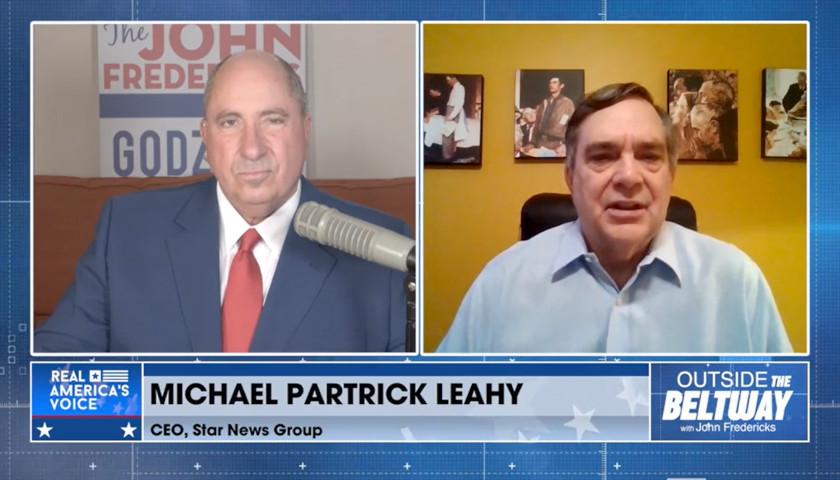Live from Music Row, Friday morning on The Tennessee Star Report with Michael Patrick Leahy – broadcast on Nashville’s Talk Radio 98.3 and 1510 WLAC weekdays from 5:00 a.m. to 8:00 a.m. – host Leahy welcomed the original all-star panelist Crom Carmichael to the studio for another edition of Crom’s Crommentary.
CROM CARMICHAEL:
Michael, it’s interesting, you hear a lot of political people and you hear media people, and in particular politicians, you would expect them to say this, but media people are constantly talking about income inequality and how terrible things are in this country and one thing after another on that subject matter.
And this is a problem because you and I have discussed that human beings are designed to work as adults. And if adults, if as adults, human beings don’t work, the chances that they’ll be happy are very, very low.
And the obvious question about whether or not they’re ever productive is answered because they’re not working. If you’re not working, then you’re not producing anything. And if you are a consumer, then somebody else is having to work to create what you are consuming.
The Wall Street Journal says, “Real government transfer payments to the bottom 20 percent.” So what this article does is it divides the country economically into five quintiles, and each 20 percent is a quintile.
But it says that the transfer payments from 1967 to 2017. And by the way, most really intractable types of problems don’t happen overnight. There’s a seed that’s planted, that’s a bad seed, and then over time it grows and it becomes much, much worse. So 1967 was when the Great Society started.
And since that time, transfer payments have increased to 269 percent from 1967 to 2017. And so that’s a 50-year period. But middle-income households have seen their real income after taxes rise at only 154 percent. Now, that’s a huge difference.
And so what this article goes on to point out is that people in the bottom 20 percent quintile, including transfer payments, make $48,000 a year and change, and the people in the quintile just above them make $50,500 in that bottom quintile.
Michael only 36 percent of those people are employed in the quintile above that. Virtually all of those people are employed. And so what you have is you have people who are working very hard in the second quintile and they’re making 5 percent more, including transfer payments, than the people who aren’t working at all.
Now, in 1967, when the Great Society started, almost two-thirds of the people in the bottom quintile did work. And if you work, there’s a very good chance that your income will advance considerably over time. But if you don’t work, then your income isn’t going to go up because you’re not training; you’re not learning anything.
And so you’re going to be sitting there in that $48,000, which is not a terrible place to be, but you’re not producing anything, and so you’re not going to be happy. And so then if you end up having a family, you’re going to be passing along that lack of work ethic to that family. And this all ties together.
The bottom quintile has this also issued bottom quintile has 1.92 people per household, the next quintile up has 2.41. So if you divide it by the number of people in the household, the bottom quintile is actually better off than the one above it, and then the quintile above that is 2.62.
We’re talking about here 60 percent of the population. And so if you want to do better economically and be a happier person our policies are making it more and more difficult to be productive in the sense that you can gain financial independence because of the taxes that are needed to pay for people who are not productive.
The taxes that are needed to pay for people who aren’t working is just growing and growing and growing. And it’s taxed directly and indirectly. And this is a problem that when Republicans get in office, Republicans under Gingrich tried to address it with welfare reform.
Clinton vetoed that three times and then finally passed it and said, there’s a bunch of things in here I’m going to change. Those things have been effectively changed back. And so part of the angst that we have, part of the inflation, most of the inflation we have, is because we’re trying to figure out how to actually reward them for not working. And obviously, that is not effective over time. And we’re now, at the end of that time,
Listen to today’s show highlights, including this interview:
– – –
Tune in weekdays from 5:00 – 8:00 a.m. to The Tennessee Star Report with Michael Patrick Leahy on Talk Radio 98.3 FM WLAC 1510. Listen online at iHeart Radio.
Photo “Woman Working on Car Parts” by Chevanon Photography.









Too many people are riding in the cart, and there will soon not be enough people to push it.
Nothing new here. This has been on the increase for decades. Buying votes and pampering spoiled brats has become the norm.
When government incentivizes people to not work, or fraud for that matter, people will take advantage of it. we the people must insist that the people we elect stop making excuses for not ending the free flow of government (wealth redistribution) funding and start being honest with the public. Free Money, also known as “Grant Funding” needs to end until we have our financial house in order.